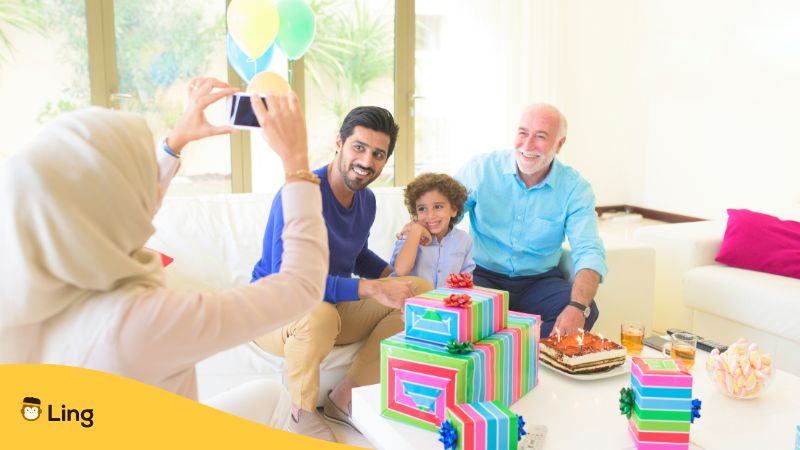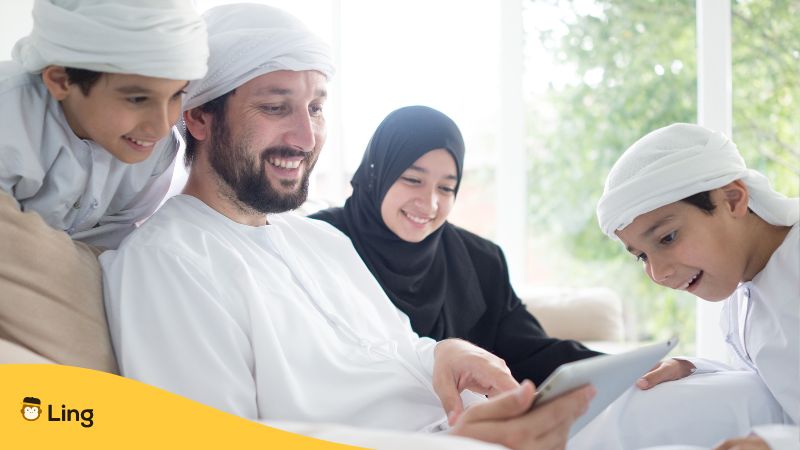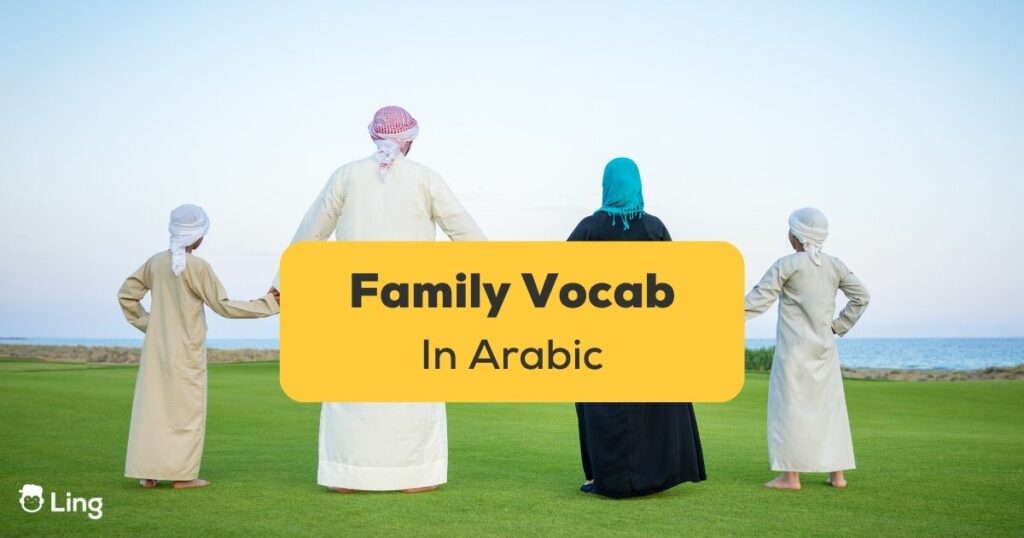Are you looking to learn more about family relations in the Arabic language? Do you want to be able to name and refer to your loved ones accurately? If so, this guide is for you! Here, we will explore the unique and diverse vocabulary used for family members in the Arabic language. From grandparents to nieces and nephews, we’ll cover the basics of Arabic vocabulary for family relations and provide useful examples for further reference. But let’s first understand the complexity of family relations in Arab culture.
The Complexity Of Family Relations In Arab Countries
The Arabic word for family is عائلة (eayila), and family members is أفراد الأسرة (‘afrad al’usra). The importance of family ties in Arab countries cannot be overstated. From large family gatherings to deep-rooted traditions, family relations in Arab countries are an integral part of the culture. It is also a source of complexity and can be challenging for those unfamiliar with the nuances of these relationships.
Let’s explore the complexity of family relations in Arab countries, delving into how these ties are formed and impact everyday life. We will also examine how family dynamics have changed over time and how they continue to evolve in today’s modern world.
The Role Of The Family
Family is of paramount importance in Arab countries, and its role is seen as essential for the functioning of society. The concept of family is closely intertwined with religion and is seen as the foundation for social order. The extended family is often viewed as a unit rather than a collection of individuals and strongly impacts each member’s life.
Respect and loyalty to family are highly valued, and those who fail to adhere to the family’s expectations are often ostracized. Family members do not usually have a hand in many aspects of their relatives’ lives, such as marriage, education, and employment.
The strong sense of unity and commitment to family ties means that members are expected to support and protect each other in times of need. The role of the family in Arab countries is an integral part of daily life, and its importance should never be underestimated.
The Extended Family

In Arab countries, the family is extended beyond just the nuclear family, and relatives such as grandparents, aunts, uncles, and distant cousins are considered family. These extended family members often share a strong bond, providing help and support to each other when needed.
Within the extended family, there is a unique hierarchical structure, with age and gender playing an essential role in establishing roles and responsibilities within the family. Older family members typically act as the head of the family, and younger generations often take care of their elderly family members. The extended family also protects its members and ensures that traditions and values are kept alive.
Families come together during holidays and special occasions, where they enjoy traditional meals and exchange gifts. This helps to strengthen the bond between family members and enhances the sense of belonging within the family.
In many cases, extended family members will also provide financial assistance when needed, which helps alleviate poverty in Arab countries. Extended family members are also expected to defend each other if needed, and this type of loyalty and devotion to one another is highly valued in Arab culture.
In-Laws And Out-Laws
In Arab countries, the relationship between in-laws and out-laws is significant. This can be defined as the relationships between the family of a married couple. In many Arab countries, extended family ties are substantial and often form the basis for a successful marriage.
In-laws are considered part of the family, and their opinions and wishes are often considered when making decisions about the family. In some cases, extended families can even influence a marriage itself. It is common for an in-law to provide advice or guidance to a newlywed couple and to help resolve any issues that may arise.
On the other hand, out-laws are seen as outsiders, and their opinion is not considered when it comes to family matters. As a result, there can sometimes be tension between in-laws and out-laws. To ensure harmony in the family, both sides need to respect each other’s opinions and avoid clashes between them.
Marriage
Marriage is an essential rite of passage in Arab countries. In most cases, marriage is between two individuals from the same sect or tribe and is arranged by their families.
Depending on the tradition and region, various rituals may be involved in a marriage, including the bride and groom’s “first meeting” and formal ceremonies with an exchange of gifts. Family is often at the center of marriage in Arab countries, and family members traditionally do pre-marriage activities like choosing a partner and arranging the wedding.
The goal of marriage in Arab culture is often to create a strong bond between two families and provide a secure, healthy environment for any children from the union. Sometimes, a dowry may be part of the agreement, which could be a monetary gift from the groom to his bride or items like furniture, jewelry, or clothing.
Children
In Arab countries, family is one of the most critical concepts in society, and children are viewed as a blessing and an integral part of any family. The responsibility of taking care of and raising children falls to both parents, but mothers typically bear a more significant portion of the burden.
Children are encouraged to respect and listen to their elders, with obedience being considered a vital quality. Education is highly valued and expected of children, especially in more urban areas where families strive for their children to excel academically. Generally, traditional values such as respect, modesty, and honoring one’s parents remain a cornerstone of raising children in Arab countries.
Arabic Vocabulary For Family Members

| English | Arabic | Romanization |
| Brother | أخ | Akh |
| Brother In Law | شقيق الزوج | Shaqiq Alzawj |
| Child | طفل | Tifl |
| Children | أطفال | Atfal |
| Daughter | بنت | Bint |
| Daughter-In-Law | ابنة بالنسب | Aibnat Bialnasab |
| Elder Brother | الاخ الاكبر | Alakh Alakbir |
| Father | أب | Ab |
| Father In Law | ووالد بالتبنى | Wawalid Bialtabanaa |
| Husband | زوج | Zawj |
| Mother | الأم | Al’umu |
| Mother In Law | حماة ” أم الزوج أو أم الزوجة | Huma ” ‘umu Alzawj ‘aw ‘umu Alzawja |
| Parents | آباء | Aba’an |
| Partner | شريك | Sharik |
| Siblings | إخوة | Iikhwa |
| Sister | أخت | Ukht |
| Sister In Law | أخت الزوج أو اخت الزوجة | Ukht Alzawj ‘aw Akht Alzawja |
| Son | ابن | Abn |
| Son-In-Law | ابنه قانونياً | Aibnuh Qanwnyaan |
| Step Daughter | ابنة الخطوة | Aibnat Alkhatwa |
| Step Son | خطوة ابنه | Khatwat Aibnih |
| Stepbrother | أخ غير شقيق | Akh Ghayr Shaqiq |
| Stepfather | زوج الأم | Zawj Al’umi |
| Stepmother | زوجة الأب | Zawjat Al’ab |
Wrapping Up

In this post, we learned that respect and loyalty to family are deeply ingrained values in Arabic culture. The extended family plays a vital role in the lives of many Arabs, providing a sense of security, comfort, and support. In-laws and out-laws often factor into family dynamics but can be managed with understanding and communication. To put it simply, marriage is a sacred institution, and raising children is a top priority for many Arab families.
If you want to learn more about the language, words, and culture of the Arabs, check out the Ling app! Ling is a revolutionary platform to help you learn Arabic and 60+ languages. Its user-friendly interface and interactive chatbot make it unique and fun to use. Spending 15 minutes a day learning with Ling will show magnificent results.
Want to try it out? You can start your language learning journey with Ling today on iOS or Android.
Also, check out Arabic Numbers and New Year in Arabic.



































































